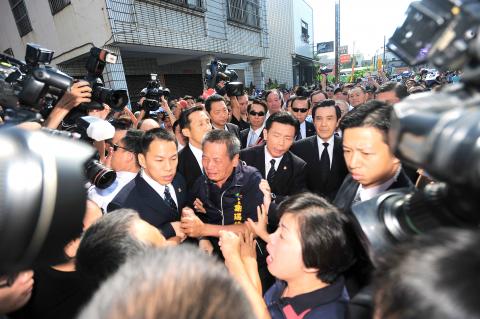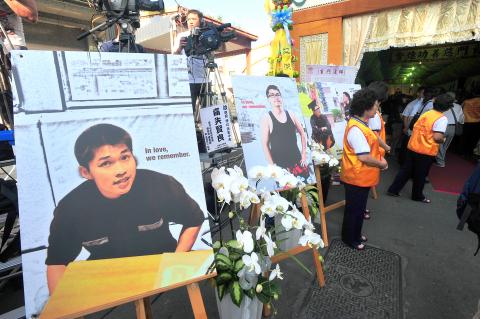Angry protesters heckled President Ma Ying-jeou (馬英九) and blocked his approach for about 20 minutes yesterday when he arrived for the funeral of army corporal Hung Chung-chiu (洪仲丘). Later the president again promised Hung’s family that he would try to uncover the truth behind the 24-year-old’s death.
Ma arrived for the funeral in Greater Taichung at 8:30am amid heckling by more than 100 angry protesters and Hung’s relatives who shouted slogans such as “We want truth,” “Give us justice,” “Ma Ying-jeou step down” and “Liar.”
Police officers had to push protestors aside to allow Ma to get from his vehicle to the Hung’s house — a distance of about 60m.

Photo: Liao Yau-tung, Taipei Times
Ma and his entourage were finally allowed to pay their respects after a borough chief Hsieh Jui-te (謝瑞德) kneeled down in front of the crowd and begged them to make way for the president.
Ma was subjected to more protests and heckling as he was leaving the funeral.
Hung died on July 4, two days before his scheduled discharge from the military, allegedly of heatstroke that resulted from strenuous physical punishment for bringing a smartphone with a camera onto his base in violation of regulations. His death has sparked public outrage and mass protests by tens of thousands of people demanding justice and reforms in the military.

Photo: CNA
Ma, accompanied by Greater Taichung Mayor Jason Hu (胡志強), newly appointed Minister of National Defense Andrew Yang (楊念祖) and former defense minister Kao Hua-chu (高華柱), again promised the family that they would seek to uncover the truth behind Hung’s death.
“Just as protesters rallied on Ketagalan Boulevard yesterday [Saturday] demanding truth, yes, the truth is the point, this must be clear,” Ma said.
Ma said the facts of the case would be revealed during the trial for the 18 military personnel who have been indicted.
“Many things that were not made public during the prosecutors’ investigation will be closely examined by the military courts,” he said.
Ma said that although the case will be tried by a military court, if an amendment to the Code of Court Martial Procedure (軍事審判法) is made to allow cases of abuse in the military be reviewed in civil courts, it would be transferred.
He added that the Executive Yuan has formed a task force to amend the law and negotiate with the legislature in a bid to allow Hung’s case to be tried by a civilian court as soon as possible.
Hung’s father told Ma that the family was angry about the military prosecutors’ indictment because Hung was slandered in it, as it said Hung’s colleagues and superiors sent him to detention in part because he altered his physical fitness test results and did not carry out his duties.
The family was also angered by a decision by the Military High Court to release four leading defendants on bail immediately after they were referred to the court for trial, ruling that what they had not been charged with serious crimes.
Ma sought to reassure the family, saying that military prosecutors are appealing the Military High Court’s decision to release the four. He also urged the family to help the court discover the truth during the trial.
Meanwhile, Hung’s relatives said they suspect that their telephones have been tapped and have expressed fears about intimidation by the authorities.
Hung’s mother asked Ma to protect her family from harassment and ensure their safety.
Ma promised to look into the complaints and said that anyone found to have illegally tapped the family’s phones will be held accountable.
Later yesterday, the ministry said it has not authorized any such monitoring and will punish anyone in the military found to have done so.
Meanwhile, hours after the funeral, homicide was listed as the cause of Hung’s death on the third death certificate issued by the military prosecutors. The prosecutors met with the family in the afternoon and handed over a document saying Hung died of homicide, Hung’s sister Hung Tzu-yung (洪慈庸) said.
The certificate was issued hours after the family complained to Ma that the military prosecutors had refused to list the cause of death, even though a coroner asked by the military to perform an autopsy said publicly that the soldier died of causes “inflicted by others.”
On the first certificate issued days after the soldier’s death on July 4, the cause of death was listed as “accidental.”
After protests by the family and a public outcry, a second certificate issued late last month said the cause of death “remains to be verified.”
Meanwhile, 32 days after his death and hours after his funeral, homicide was listed as the cause of Hung’s death on the third death certificate issued by the military prosecutors. The prosecutors met with the victim’s family in the afternoon and handed over a document saying Hung died of homicide, said Hung’s sister Hung Tzu-yung.
The certificate was issued hours after the family protested to Ma that the military prosecutors refused to list Hung Chung-chiu’s cause of death even though a coroner asked by the military to perform an autopsy said publicly that the soldier died of causes “inflicted by others.”
On the first certificate issued days after Hung’s death on July 4, the cause of death was listed as “accidental.”
After protests by the family and a public outcry, a second certificate issued late last month said the cause of death “remains to be verified.”

SECURITY: As China is ‘reshaping’ Hong Kong’s population, Taiwan must raise the eligibility threshold for applications from Hong Kongers, Chiu Chui-cheng said When Hong Kong and Macau citizens apply for residency in Taiwan, it would be under a new category that includes a “national security observation period,” Mainland Affairs Council (MAC) Minister Chiu Chui-cheng (邱垂正) said yesterday. President William Lai (賴清德) on March 13 announced 17 strategies to counter China’s aggression toward Taiwan, including incorporating national security considerations into the review process for residency applications from Hong Kong and Macau citizens. The situation in Hong Kong is constantly changing, Chiu said to media yesterday on the sidelines of the Taipei Technology Run hosted by the Taipei Neihu Technology Park Development Association. With

CARROT AND STICK: While unrelenting in its military threats, China attracted nearly 40,000 Taiwanese to over 400 business events last year Nearly 40,000 Taiwanese last year joined industry events in China, such as conferences and trade fairs, supported by the Chinese government, a study showed yesterday, as Beijing ramps up a charm offensive toward Taipei alongside military pressure. China has long taken a carrot-and-stick approach to Taiwan, threatening it with the prospect of military action while reaching out to those it believes are amenable to Beijing’s point of view. Taiwanese security officials are wary of what they see as Beijing’s influence campaigns to sway public opinion after Taipei and Beijing gradually resumed travel links halted by the COVID-19 pandemic, but the scale of

A US Marine Corps regiment equipped with Naval Strike Missiles (NSM) is set to participate in the upcoming Balikatan 25 exercise in the Luzon Strait, marking the system’s first-ever deployment in the Philippines. US and Philippine officials have separately confirmed that the Navy Marine Expeditionary Ship Interdiction System (NMESIS) — the mobile launch platform for the Naval Strike Missile — would take part in the joint exercise. The missiles are being deployed to “a strategic first island chain chokepoint” in the waters between Taiwan proper and the Philippines, US-based Naval News reported. “The Luzon Strait and Bashi Channel represent a critical access

Pope Francis is be laid to rest on Saturday after lying in state for three days in St Peter’s Basilica, where the faithful are expected to flock to pay their respects to history’s first Latin American pontiff. The cardinals met yesterday in the Vatican’s synod hall to chart the next steps before a conclave begins to choose Francis’ successor, as condolences poured in from around the world. According to current norms, the conclave must begin between May 5 and 10. The cardinals set the funeral for Saturday at 10am in St Peter’s Square, to be celebrated by the dean of the College